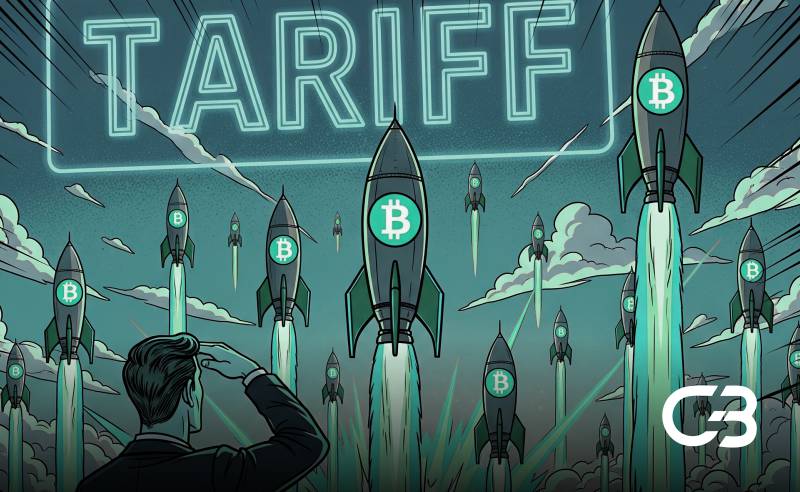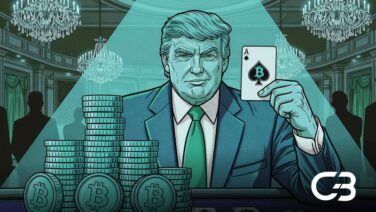Tariffs have been an essential element in international trade and determine industries in various parts of the world. As cryptocurrencies continue to rise to prominence, these economic policies are directly influencing the ecosystem of digital currencies.
Impact of Tariffs on Traditional and Digital Markets
Tariffs are a form of tax that governments slap over the imported goods in order to protect their own domestic industries making foreign goods more costly. They have in the past brought turmoil to the market leading to inflation and reducing trade between countries. Tariffs have become an element of market variations, which are reflected in the digital age as cryptocurrencies.
- Short-term Effects: Tariffs result in fluctuations of assets making investors shy off risky investments, such as crypto.
- Inflation :Increased tariffs can drive inflation, reducing purchasing power in both traditional and digital economies.
- Investor Sentiment Relationship: The market feelings towards crypto markets are negative as economic uncertainty caused by tariffs means that an investor will react negatively to the market.
Tariffs and the Influence on Crypto Prices
The implementation of tariffs can carry an immediate and distant impact on the cryptocurrency prices. Crypto investors tend to abandon more risky assets when alteration of the global trade policies occurs, thus there is a decline in prices. In one of the examples, when the US placed tariffs on China in 2025, Bitcoin began to lose value, which indicates tariff policies sensitivity by any market.
- Short Term Price Dips: The announcement of tariffs causes prices of cryptocurrencies to dip because of the resulting uncertainty, causing risk aversion.
- Market Panic: It occurs as the price of Bitcoin fell when the US placed tariffs on China, indicating the reaction to economic policy changes in crypto.
- Volatility Spillover: Due to the uncertainty in traditional markets, uncertainties spill to the crypto market leading to more volatility.
Crypto Mining and Rising Costs
Tariffs are a big influence on cryptocurrency mining, particularly to those using imported equipment. The tariffs imposed on semiconductor chips, ASIC miners, and GPUs mostly of Chinese origin, may significantly raise the operation costs. This may compel miners to move to a location that is less expensive or adjust the operation so that tariff may not have an impact.
- Heightened Expenses: Tariffs escalate the prices of mining technologies/hardware, which makes it less profitable to mines using overseas supplies.
- Mining Relocation: Possibly encouraging the miners to relocate to where the tariff is lesser and more trades can be carried with less operation cost.
- Shortage of Hardware: The tariff levied on semiconductor chips may lead to resource deficiency making it a challenge to attain the required materials.
Long-Term Effects of Tariffs on Crypto Adoption
The economic instability caused by the tariffs in the long term can stimulate further use of cryptocurrencies, especially Bitcoin. People tend to use crypto as a store of value as traditional fiat currencies become devalued because of inflation or new economic policies. Argentina and Turkey are among the countries with hyperinflation or an economy on the brink of collapse, leading to a rise in using cryptocurrencies.
- Store of Value: Bitcoin is considered as a hedge towards economic crises and inflation especially in a nation with depreciating currency.
- Inflation Hedge: The surge towards increased inflation has seen many resort towards crypto as a change with fiat currencies that lose value.
- Increasing Adoption: With the tariffs decreasing the value of fiat currencies, there is an increased demand in decentralized currencies such as Bitcoin.
Regulatory Changes in Response to Tariffs
Tariffs are also one of the possible ways for the government to support their local industries, and they might be trying to control cryptocurrencies more actively. The increased trend in the usage of crypto might also require local authorities to establish new regulations, including the introduction of taxes on transactions or more rigid rules of exchange. Such policies could be an attempt to regulate crypto markets and make them abide by the consequences of general economic policies which are influenced by tariffs on trade.
- Regulation Impact: Tariffs can make governments respond by tightening regulation because governments believe the growth of crypto is questioning the current financial systems.
- New Taxes: Nations can impose new taxes, fees on transactions, among cryptocurrencies, which affects market behavior.
- International Collaboration: Certain countries can establish online trade associations, where blockchain is implemented to lower costs and prevent the use of conventional paying taxes.
Conclusion
Cryptocurrencies are heavily impacted by tariffs, which can influence the mood of investors, the prices of maintenance services, and adoption. Although tariffs would usually cause price fluctuations and decrease, they might stimulate more users to consider crypto as their inflation hedge. Regulatory institutions can also include new provisions in the old economic system to match the progressive crypto world as digital currencies increase. The tariffs will remain defining the sphere of global trade and digital finances, introducing challenges and opportunities to the crypto future.









